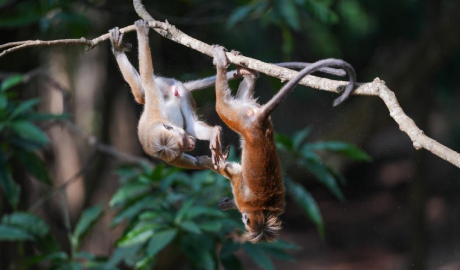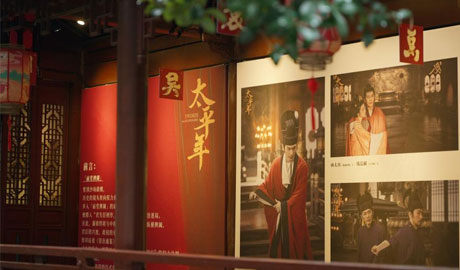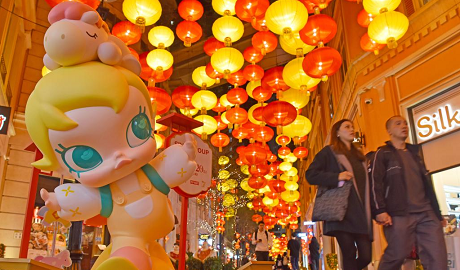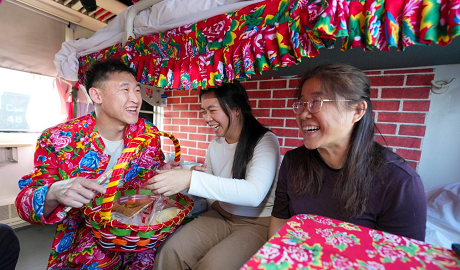

On July 7, 1937, the Japanese invaders brazenly attacked Wanping City, launching a full-scale war of aggression against China. The 29th Army of the National Revolutionary Army stationed in the Peking-Tianjin area rose up to resist. The heroic deeds of the renowned Big-Sword Squad greatly inspired the enthusiasm of the military and civilians across the country to resist the Japanese invasion.
The gunfire at Lugou Bridge became the clarion call for the Chinese nation's general mobilization against Japanese aggression. On July 8, the Central Committee of the Communist Party of China issued a telegram to the nation: "Peking and Tianjin are in danger! North China is in danger! The Chinese nation is in danger! Only through a nationwide resistance can we find our way out!" It further appealed: "All Chinese compatriots, governments, and armies, unite to build a solid great wall of the national united front and resist the Japanese invaders!"
Mass rallies took place across the country, and a wave of resistance against Japanese aggression swept the nation. A 22-year-old young man returned home from a rally at the Shanghai Professional National Salvation Association, his heart pounding so fiercely he could not sleep. As the first rays of dawn pierced the room, he rose and walked to the window. Gazing toward the eastern horizon, he murmured to himself, "The day of resistance has arrived!" Repeating these words, he burst into excited singing. After singing them several times, he realized they expressed both the nation's longing for resistance and the conviction of eventual victory. He then expanded them into four powerful lines: "Our swords raised over the devils' heads, hack'em off! Brothers of the 29th Army! The day of our defense has come! The day of our defense has come!"
The young man recited the lyrics repeatedly, mentally memorizing the pitch, intonation, strength, and rhythmic changes in his voice. He quickly assembled these flashes of inspiration and melody in his mind, finally forming a complete musical piece. In just one day, "The Sword March", dedicated to the Big-Sword Squad of the 29th Army, burst forth from his heart. This young man was Mai Xin, a young composer who rose to prominence in the "National Defense Music" movement under the Communist Party's leadership.
On August 8, 1937, the Shanghai Confucian Temple held the founding ceremony of the National Salvation Song Association, with thousands in attendance. Mai Xin, standing on the terrace, led the crowd in a chorus of the "The Sword March", expressing the Chinese people's deep hatred for the Japanese invaders and their determination to fight the Japanese invaders to the end. Based on public feedback, Mai Xin finalized the song by changing "brothers of the 29th Army" to "the whole nation's armed brethren" and "our 29th Army is not alone," to "our Chinese army, valiantly advancing!" making it more relevant to the nationwide wave of resistance against Japanese aggression. At this very conference, Mai Xin issued the battle manifesto, "Hundreds of Millions of Guns Aimed at One Enemy":
The current situation reveals to us that a nationwide war of resistance will inevitably break out soon... As citizens of China, we must shoulder our responsibilities as citizens. Let hundreds of millions of guns unite and aim at one enemy—Japanese imperialism—to slay it and drive it out!
With its passionate melody and inspiring lyrics, "The Sword March" quickly spread across the country, inspiring hundreds of millions of people to take up arms, rush to the front line and fight the enemy courageously.
After the fall of Shanghai, unarmed students faced Japanese military police, singing "Our swords raised over the devils' heads, hack'em off!" and taking to the streets to raise funds. During the Battle of Taierzhuang in 1938, the 31st Division's Field Service Corps performed "The Sword March" at key junctions along the route to the front lines, chanting the slogan “We vow to stand or fall with Taierzhuang”. The Xin’an Travel Group, organized by educator Tao Xingzhi, promoted anti-Japanese songs nationwide, featuring songs such as "March of the Volunteers", "The Sword March", and "The Last Stand of Sacrifice", which were warmly received.
"The Sword March" also had a widespread impact overseas. At the 1938 Anti-Fascist Aggression Movement Conference in Paris, musician Ren Guang conducted a chorus of overseas Chinese singing songs of national salvation, including "March of the Volunteers" and "The Sword March". These songs resonated deeply with delegates from various countries, who commented, "China's modern songs embody China's infinite hope and strengthen the world's confidence in victory in the anti-fascist struggle". In 1939, "The Sword March" and other songs were translated into English and included in Li Baochen's anthology "Chinese Songs in the War of Resistance Against Japanese Aggression", showcasing the achievements of China's wartime songwriting to the world. In 1940, renowned patriot Liu Liangmo traveled to the United States and organized an overseas Chinese youth choir. "We practiced every Sunday afternoon. I taught them songs of the War of Resistance Against Japanese Aggression that were widely sung in China at the time, such as 'Soldiers' Patriotic Song', 'The Sword March', and 'March of the Volunteers'. They sang these songs to overseas Chinese and the American people whenever they had the chance."
In 1962, the Central Song and Dance Troupe adapted the "The Sword March" into a men's group dance. As choreographer Zhao Wanhua recalled, "When developing a program about revolution, I loved the big sword, a traditional Chinese martial art, and the music itself, which I've admired since childhood. The idea for this dance was inspired by a nighttime attack on the enemy. I found the dynamics of rolling big swords in martial arts books, and I also interviewed people in places like Mentougou, Beijing, and learned a lot of folk wisdom from daily life." This adaptation of the song demonstrates the enduring power of the revolutionary legacy.
"Young men determined to save China, wrote lyrics and composed music to join the fight, traveled north and south to rally the masses. Even today, I still hear the song of the Sword March." In 2015, "The Sword March" was selected as one of the "Top 10 Favorite Songs of the War of Resistance Against Japanese Aggression" by the State Administration of Press, Publication, Radio, Film, and Television. The cry of "slashing at the enemy with big swords" remains resonant today, expressing the indomitable fighting spirit, the unwavering belief in victory, and the heroic spirit of fighting to the bitter end. It has inspired generations of Chinese people to brave the enemy and forge ahead courageously.
Find the original article at https://news.neamco.com/2025-07/17/content_38157289.htm
Written by Huang Minxue, Part-time Research Fellow at the Zhejiang Yue Culture Inheritance and Innovation Research Center, Shaoxing University
Translated by Wang Shuhan

Various festive events held across China to celebrate upcoming Chinese New Year


Hit epic drama sparks interest in lesser-studied chapter of ancient Chinese history

Lanterns hoisted to mark upcoming Chinese New Year in Hong Kong

"In-train fair" launched in NE China's Heilongjiang amid Spring Festival travel rush
点击右上角![]() 微信好友
微信好友
 朋友圈
朋友圈

请使用浏览器分享功能进行分享
